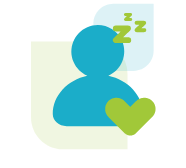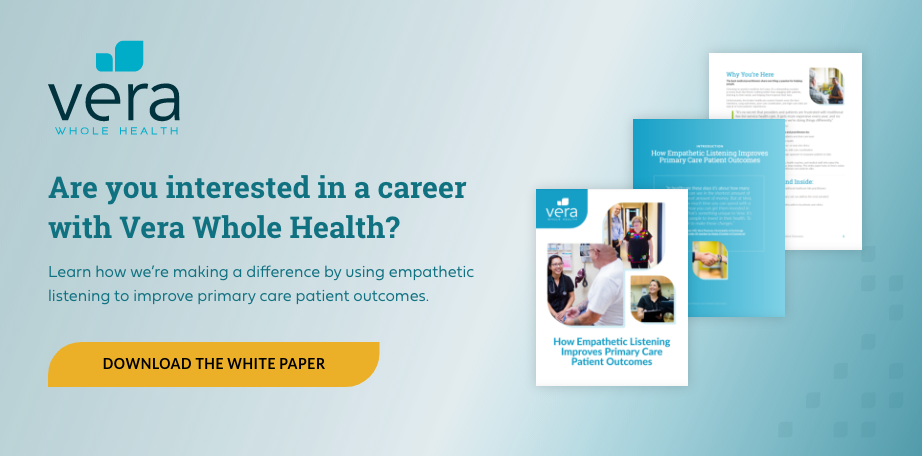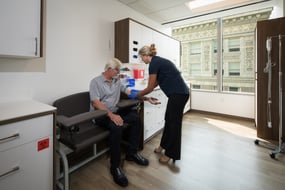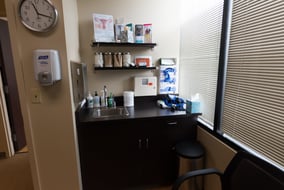If you’ve been feeling it, you’re certainly not alone. COVID-19 fatigue is real and, as we head into another winter and the days begin to get shorter, you might start struggling with the effects even more.
What is COVID-19 fatigue?
Put simply, it's stress.
Uncertain times and circumstances trigger the fight-or-flight instinct. And while everyone reacts slightly differently, a UMass Medical School article written on this subject found that we tend to move in one of four directions when triggered by this response:- We stay and fight to resist the threat
- We flee to escape the threat
- We freeze in our tracks
- We give in to the threat
What’s your tendency? How did you react to the pandemic at first? No matter your answer, it’s likely you’re still feeling the effects. And it’s no doubt overwhelming.
Whereas many stressors are short-term — and the body understands how to deal with and move on from those quickly and without many, if any, lasting ill-effects — the pandemic has lasted well over a year. This will be your second winter enduring these unusual circumstances. And from a physiological point of view, such prolonged stress is unhealthy and rather unusual. It comes with its own set of consequences, which include:
- Heightened anxiety
- Heightened blood pressure
- Increased risk of cardiovascular disease
- Reduced immunity
- Reduced longevity
- Reduced happiness
Because of its long-term nature, this stress often puts us in a seemingly perpetual state of limbo. We toggle back and forth between just two reactions: freezing and giving in.

So what can we do about it?
Here at Vera Whole Health, our coaches and behavioral health consultants (BHCs) are here to support you. We offer another layer of support so that you can find your way out of limbo and move forward towards a healthier post-COVID-19 life.
One of our Vera providers shares this with her patients who are struggling right now:
"Acknowledge that your daily activity/movement and eating has changed and may or may not be as accurate as you think with COVID-19. The first step is to simply acknowledge and take a look at it, review, and then figure out what is different."
— Pam Schultz-Torosian, DO
Dr. Schultz-Torosian shares that moving more (even in small 2-5 minute bouts) and looking at the types of foods, the amounts, and when you are eating are making a big difference for many of her patients. She said even recognizing small changes is helping
her patients move toward good overall health and well-being.
Here are a few ways you can reduce COVID-19 fatigue and work to recreate balance:
1. Ask for help when you need it
 It's scary to feel alone and overwhelmed. If stress and anxiety are getting in the way of your daily activities, seek help. Know that our providers and Vera health coaches are here for you. We can work with you to determine baby steps you can take to get support and cultivate healthy habits for dealing with stress that will last far beyond the current crisis.
It's scary to feel alone and overwhelmed. If stress and anxiety are getting in the way of your daily activities, seek help. Know that our providers and Vera health coaches are here for you. We can work with you to determine baby steps you can take to get support and cultivate healthy habits for dealing with stress that will last far beyond the current crisis.
2. Go ahead and move your body
 First things first. As Dr. Schultz-Torosian says, you have to, “... acknowledge that your daily activity/movement and eating has changed... Review, and then figure out what is different.”
First things first. As Dr. Schultz-Torosian says, you have to, “... acknowledge that your daily activity/movement and eating has changed... Review, and then figure out what is different.”
This is where health coaching can help. If getting back into an exercise routine, for example, feels like a daunting prospect, they’ll guide you on how to get started. They’ll help you make small adjustments at first, like walking (instead of driving), attending a virtual gym class, finding exercise videos, getting outside and doing yard work, or going on a hike. JAMA Psychiatry found even small increases in exercise can have a huge impact on mental health.
3. Begin finding ways to eat better
 Eating healthier foods can be a big mood booster, as explained in this article published by Harvard Health. As COVID-19 wore on, many of us changed our eating habits — from how we were shopping, to how we prepared our food. For many of us, working from home has meant the snacking and mindless trips to the refrigerator have increased, along with our intake of sweets, salty foods, and alcohol. These changes in eating habits are known contributors to fatigue and mood change.
Eating healthier foods can be a big mood booster, as explained in this article published by Harvard Health. As COVID-19 wore on, many of us changed our eating habits — from how we were shopping, to how we prepared our food. For many of us, working from home has meant the snacking and mindless trips to the refrigerator have increased, along with our intake of sweets, salty foods, and alcohol. These changes in eating habits are known contributors to fatigue and mood change.
Another Vera provider has this to say about getting back on track with nutritional eating:
“It is important to take a good inventory of where you have energy left at this point in the pandemic. If grocery shopping, meal prep, and intentional eating choices have fallen by the wayside, recognize that something has to be put on the back burner for most of us. Pause and shed any guilt that might come with reprioritizing. However, for many patients, putting up conscious buffers in their food habits has been important to get back on track toward the whole food, plant-focused diet that has been proven to improve long-term health outcomes.”
— Jlyn Pritchard, DO, Family Medicine Physician
Here are some of her other tips:
- Schedule mealtimes. If working from home, try to restrict mindless snacking.
- Minimize time in the kitchen with meal planning and prepping. Try re-using ingredients (like brown rice!) throughout meals during the week after cooking one large batch. (For example, Monday: chicken stir fry with rice, Wednesday: red vegetable curry with rice, etc.)
- Keep meals simple and with basic ingredients. Things don't need to be fancy to be delicious.
- If you've developed a sweet tooth (like me!) or find yourself snacking on rich foods like cheese and deli meats, try planning a “special” night (since many of us cannot go out as often). In our house, Friday night is pizza night for the kids and cheese/chocolate night for the adults. Planning ahead like this helps us stay on track during the week because we know we have a special dinner to look forward to!
4. Create meaning through connection
 Reaching out to others — friends, family, acquaintances, and even those you may not know yet — and staying in touch can be a way to get the support you need. We are all in the same boat; you’re not alone. And it’s good to be reminded of that. One study from the Drexel University School of Public Health found cognitive abilities declined 70% more gradually in people with frequent social connections, compared to those who who were more isolated. So many of us are experimenting and learning new things about our response to stress over this year — including Vera health coaches. But it’s that connection with others that keeps everyone, health coaches and patients alike, feeling supported and inspired.
Reaching out to others — friends, family, acquaintances, and even those you may not know yet — and staying in touch can be a way to get the support you need. We are all in the same boat; you’re not alone. And it’s good to be reminded of that. One study from the Drexel University School of Public Health found cognitive abilities declined 70% more gradually in people with frequent social connections, compared to those who who were more isolated. So many of us are experimenting and learning new things about our response to stress over this year — including Vera health coaches. But it’s that connection with others that keeps everyone, health coaches and patients alike, feeling supported and inspired.
NPR published this excellent article with ideas to help you avoid feeling too isolated during the winter portions of the pandemic.
5. Find times to unplug and disconnect
 When you work from home or are on the computer all day, it’s easy to overdo the screen time. With the frenetic pace of life and the sheer number of important news headlines all vying for our attention, it can be challenging to unplug and disconnect.
When you work from home or are on the computer all day, it’s easy to overdo the screen time. With the frenetic pace of life and the sheer number of important news headlines all vying for our attention, it can be challenging to unplug and disconnect.
This has been a prevalent theme with coaching patients this past year. One study found a direct correlation between frequency of social media exposure and symptoms of depression and anxiety.
I've noticed that consciously setting limits on social media use, watching TV, and other screen time has made a huge difference. It has created an opening for people to do what they love and has helped them avoid the downward spiral that too much news and media can bring.
6. Strengthen your spiritual side
 Try prayer, meditation, engaging with religious groups, motivational podcasts, readings, or anything else that speaks to you, lifts your spirits, and feeds your core values. It’ll help you stay grateful, positive, and grounded. It also decreases loneliness, worry, and fatigue.
Try prayer, meditation, engaging with religious groups, motivational podcasts, readings, or anything else that speaks to you, lifts your spirits, and feeds your core values. It’ll help you stay grateful, positive, and grounded. It also decreases loneliness, worry, and fatigue.
A health coach can work with you to create a structured plan of action that enables you to refocus on your core values. It will enable you to acknowledge what is in your control and what isn't. And it will encourage you to have a positive outlook that may give you an outlet to self-discovery. This builds resilience in these uncertain and difficult times.
7. Craft a plan
 Anticipating potential pitfalls and devising a plan, and even a back-up plan, are not actions that come naturally for most of us. Some of us tend to procrastinate because we’re overwhelmed. Others jump in too quickly (that fight response).
Anticipating potential pitfalls and devising a plan, and even a back-up plan, are not actions that come naturally for most of us. Some of us tend to procrastinate because we’re overwhelmed. Others jump in too quickly (that fight response).
Connecting with a health coach can be a way to subdue these stress responses. You’ll have a guide — a partner — helping you to sort out a direction and devising a plan to move forward. Also, a health coach keeps you accountable. You can check in with them, and they’ll be a sounding board for different approaches and strategies that you can try.
Connecting with a coach can be a way to subdue these stress responses. You’ll have a guide — a partner — helping you to sort out a direction and devising a plan to move forward. Also, a coach keeps you accountable. You can check in with them, and they’ll be a sounding board for different approaches and strategies that you can try.
8. Keep trying
 Staying the course and continuing to move forward is critical. One coaching patient spent the last year working on his personal growth and development. He came out a year later (to summarize his words) feeling lighter, stronger, and more resilient than he had ever been in his life. One of his tips was to stay physically but not socially distant from the people that truly supported him and to keep working on the substance of his life.
Staying the course and continuing to move forward is critical. One coaching patient spent the last year working on his personal growth and development. He came out a year later (to summarize his words) feeling lighter, stronger, and more resilient than he had ever been in his life. One of his tips was to stay physically but not socially distant from the people that truly supported him and to keep working on the substance of his life.
If you’re looking for ways to build your resilience this winter, this article from Everyday Health also has some good tips.
9. Prioritize building good sleep habits
 It's normal to lose some sleep while managing stress and uncertainty. Coaching around sleep hygiene is a topic most of us work with patients on. We seem to be juggling more (working from home, homeschooling, never away from our families, or maybe the opposite if you’re isolated) and have less (or more) of a commute.
It's normal to lose some sleep while managing stress and uncertainty. Coaching around sleep hygiene is a topic most of us work with patients on. We seem to be juggling more (working from home, homeschooling, never away from our families, or maybe the opposite if you’re isolated) and have less (or more) of a commute.
Coaching is like a win-learn process that allows you to explore and try on what is beneficial in terms of sleep hygiene tools that ensure healthier sleep patterns.
As you’re dealing with the fatigue of COVID-19 and all that goes along with that, remember that we all desire to become our best, most functional version of ourselves. We optimize our health when we allow other people to help us.
The Vera Whole Health team is committed to working with you to achieve your health goals, improve your well-being, and become your greatest self.
Are you interested in a career with Vera Whole Health? Download our free white paper to learn how we’re making a difference by using empathetic listening to improve primary care patient outcomes.

Editor's Note: This blog post was published in May 2021 and has been updated for accuracy and comprehensiveness.
Sign up
Join our email list to receive the latest open positions, Vera Careers news, and more.





